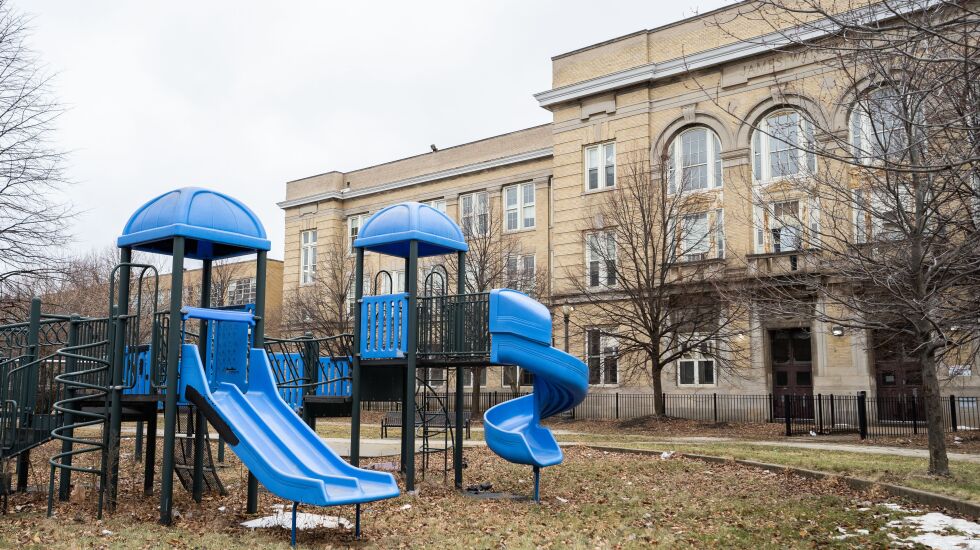
Keith White thinks it’s beautiful that Chicago officials are helping newly arrived asylum seekers, but he — like many others who crowded into the Apostolic Church of God on Thursday night — wanted to know what this will mean for Woodlawn residents.
He was among more than 100 residents who attended a more than two-hour community meeting that at times grew contentious as the city trickled out more information about the former James Wadsworth Elementary School in Woodlawn that will be turned into a temporary shelter for new immigrants.
“What about the people who have been here?” said White, who has lived in the South Side community about 30 years. “Why is it just now that it’s being fixed up?”

The shelter will open the week of Jan. 23, and it will house about 250 adult men and women, though city officials at Thursday’s meeting hinted that it could later house even more individuals during the estimated two-year period that the property, located at 6420 S. University Ave., will be used as a temporary shelter. Security contracted by the city will be present at the shelter, and those living there will have an 11 p.m. curfew.

The asylum seekers will have access to case managers and have the opportunity to attend English classes, according to the city. The city delayed opening the shelter for about two weeks following push back from community members over being left out of decisions about the location.
Mayor Lori Lightfoot’s office announced plans to regularly send updates to Ald. Jeanette Taylor — whose 20th Ward includes the shelter — and also to facilitate monthly community meetings and create an advisory council that will include two spots for Woodlawn residents to further discuss plans to assist asylum seekers.
Since late August, Republican Texas Gov. Greg Abbott has sent hundreds of asylum seekers to Democrat-led cities like Chicago. More than 5,146 had arrived on chartered buses from Texas, according to city officials. In addition, the city has provided services to at least 1,500 other recently arrived immigrants.
Some asylum seekers have also been arriving to Chicago on buses from Colorado after Gov. Jared Polis, a Democrat, arranged for those who wanted to travel elsewhere to continue their journey, the Associated Press reported.
Brandie Knazze, the commissioner for the city’s Department of Family and Support Services, apologized to the crowd Thursday, emphasizing it was a “huge mistake” to not speak to the community about the shelter.
“I’m coming here today for your support,” Knazze said to the crowd. “I know we didn’t get the ask right the first time.”

The apology did little to soothe the South Side residents at the forum, who pointed out that the city planned to move forward with the shelter despite the community feedback Thursday night.
“The deal is done,” a woman said during the public comment section.
But as the meeting ended about two-and-half hours after it started, Taylor told the crowd that the “fight is not over” about the shelter.
“Y’all gonna learn to listen,” Taylor said, seemingly speaking to city officials in attendance. “Because I told you back in October that we should have these conversations with the community.”

Speaker after speaker expressed concerns about the shelter’s curfew, the contracts involved in fixing up the property and skepticism about immigration.
Some people shouted that the immigrants should be sent to other Chicago neighborhoods like Pilsen while others said asylum seekers should be sent back to their native countries.
When one speaker suggested he would want the city to help out his family if they needed help, another man in the crowd shouted, “They would do nothing for us.”
Amid public comment, city officials said that unhoused individuals could also stay at the shelter as well. That led one man to shout, “Why didn’t they say that before?”
Kerwin Spratt, who has lived in Woodlawn more than 20 years, said he would like the city to show the South Side residents the same respect officials are showing asylum seekers. He noted that the city’s presentation mentioned providing mental health services for asylum seekers and pointed out that the city had shuttered mental health centers across Chicago.
“You threw this upon us with no regard to us at all,” Spratt said.
The Rev. Byron Brazier, of Apostolic Church of God, said it was better for someone to use the building rather than it sitting empty. He pushed for the city to ensure the community will have a say in what the property will be used for in the long term.
“It’s important that the city take our lead as opposed to us taking your lead,” Brazier said.
Many of the recently arrived asylum seekers have been from Venezuela, where residents face political and economic turmoil.
For months, Ana Gil Garcia, a longtime leader of Chicago’s Venezuelan community and part of the Illinois Venezuelan Alliance, has been helping the new asylum seekers. Before Thursday’s meeting, she described the need for shelter as a “major crisis.”
Earlier this week she was scrambling to find temporary shelter for more than a dozen people who had been allowed to stay for two days at an area hospital, but they needed to leave soon, Garcia said. She was told every shelter was at capacity as she tried to seek other alternatives in the suburbs.
“It’s frustrating, it’s painful,” Garcia said. “And we don’t know what to do.”
Elvia Malagón’s reporting on social justice and income inequality is made possible by a grant from The Chicago Community Trust.







